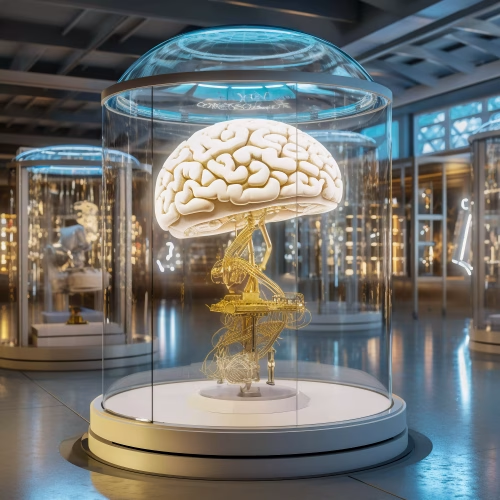What is Memory and Why is it Crucial?
Memory is not a single entity but a complex system encompassing various forms: short-term, long-term, declarative, procedural, and emotional. Each type serves a distinct purpose, from remembering a phone number for a few seconds to recalling childhood events or mastering a skill. The ability to form, retain, and recall information is vital for learning, decision-making, and navigating our daily lives. Without it, every moment would be a new experience, devoid of context or personal history. Understanding the mechanisms behind memory is paramount for addressing neurological disorders, enhancing learning capabilities, and even developing more sophisticated artificial intelligence. The field of neuroscience provides the tools and frameworks to unravel these intricate processes.
The Synaptic Symphony: How Memories Form and Consolidate
At the most fundamental level, memory formation involves changes in the strength and structure of connections between neurons, known as synapses. This concept, often summarized by "neurons that fire together wire together," is central to our understanding of learning and memory. When we learn something new, specific neural pathways are activated, leading to molecular and structural modifications at these synaptic junctions. This process, known as synaptic plasticity, includes long-term potentiation (LTP) and long-term depression (LTD), which strengthen or weaken synaptic connections, respectively. These changes are the physical basis of memory traces, or engrams. The intricate dance of neurotransmitters, receptors, and gene expression within these tiny structures is a primary focus of modern brain research, revealing how transient experiences can be converted into lasting memories. This deep dive into neurobiology is continuously revealing new insights into how our brains store information.
Beyond the Neuron: Neural Networks and Cognitive Science
While individual neurons and their connections are crucial, memories are encoded across vast, interconnected neural networks spanning different brain regions. For instance, the hippocampus plays a crucial role in forming new declarative memories, while the prefrontal cortex is involved in working memory and executive functions. The amygdala is central to emotional memories. Cognitive science bridges the gap between the microscopic world of neurons and the macroscopic world of thought and behavior. It investigates how these distributed networks collaborate to produce complex cognitive functions like memory, attention, and language. Advanced imaging techniques, such as fMRI and EEG, allow researchers to observe these networks in action, providing unprecedented insights into the dynamic processes of memory retrieval and consolidation. This holistic approach is essential for a complete understanding of memory's neural basis.
The Rise of Neurotech and Biotech in Memory Research
The past few decades have witnessed a remarkable surge in neurotech and biotech innovations that are transforming memory research. From optogenetics, which allows precise control over neural activity using light, to advanced brain-computer interfaces (BCIs) that can potentially restore lost cognitive functions, these technologies are pushing the boundaries of what's possible. For example, deep brain stimulation (DBS) is being explored for memory disorders, and novel drug therapies are being developed based on our understanding of synaptic mechanisms. These technological advancements provide powerful tools not only for understanding memory but also for developing interventions for conditions like Alzheimer's disease, PTSD, and other forms of cognitive impairment. The synergy between neuroscience and cutting-edge biotechnology is paving the way for groundbreaking solutions.
AI and the Brain: Mimicking Memory and Learning
The parallels between biological neural networks and artificial intelligence have long been a source of inspiration for both fields. AI neuroscience seeks to understand brain function by building computational models that mimic neural processes, and conversely, brain research informs the development of more sophisticated AI algorithms. Machine learning, particularly deep learning, has shown remarkable capabilities in pattern recognition and data processing, mirroring aspects of human memory. Researchers are now developing AI models that can simulate synaptic plasticity, learn from experience, and even forget, providing a computational framework for testing hypotheses about biological memory. This interdisciplinary approach is not only advancing AI but also offering new perspectives on how the brain computes and stores information, leading to a deeper understanding of cognitive processes from a computational lens.
Challenges and Future Directions in the Neuroscience of Memory
Despite significant progress, many mysteries surrounding memory remain. How are memories precisely retrieved without interference? What are the exact mechanisms of forgetting, and can they be therapeutically manipulated? The complexity of the brain, with its billions of neurons and trillions of synapses, presents immense challenges. Future directions in brain research will likely involve integrating multi-modal data from genetics, molecular biology, electrophysiology, and advanced imaging. The development of even more sophisticated neurotech tools and the continued collaboration between neuroscience, biotech, and AI neuroscience will be crucial. Initiatives like Deep Science Workshops and Deep Science Implementation are vital in fostering this interdisciplinary collaboration, providing platforms for researchers and innovators to push the boundaries of knowledge and apply cutting-edge findings to real-world problems.
Why Choose Deep Science Workshops for Your Neuroscience Journey?
For those passionate about unraveling the complexities of the brain and contributing to the next wave of scientific discovery, Deep Science Workshops offers unparalleled opportunities. Our programs, including those focused on neuroscience fundamental principles to computational synapses, provide comprehensive training, blending theoretical knowledge with practical application. We empower students and professionals to engage with cutting-edge brain research, explore the frontiers of neurotech, and understand the implications of AI neuroscience. Through hands-on experiences and expert-led sessions, you will gain a profound understanding of memory, synapses, neural networks, and the broader fields of cognitive science and neurobiology. Join us to be at the forefront of innovation and contribute to shaping the future of biotechnology and neuroscience.
Join Now
